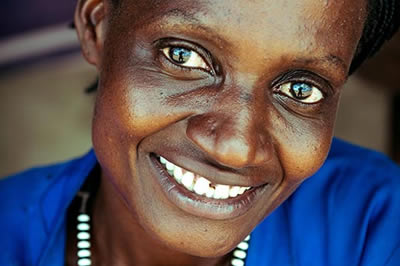 The spot where we had stopped in Kakuma Refugee Camp in northern Kenya wasn’t supposed to be anyone’s home. The open courtyard with shelters was intended for new arrivals to gather and aid workers to distribute water containers, blankets, and other supplies. But nearly 8,000 people have flooded Kakuma since the beginning of the year, the majority of them South Sudanese fleeing violence in their newly independent country. So this utilitarian zone has become a makeshift neighborhood, with women nursing babies and children chasing one another.
The spot where we had stopped in Kakuma Refugee Camp in northern Kenya wasn’t supposed to be anyone’s home. The open courtyard with shelters was intended for new arrivals to gather and aid workers to distribute water containers, blankets, and other supplies. But nearly 8,000 people have flooded Kakuma since the beginning of the year, the majority of them South Sudanese fleeing violence in their newly independent country. So this utilitarian zone has become a makeshift neighborhood, with women nursing babies and children chasing one another.
That’s where our group met Miriam. She and her 1-year-old son Israel escaped the fighting in Sudan to board a plane to safety — and the unknown. (It is less common for refugees to flee conflict zones by airplane; many more undertake days-long journeys by foot or vehicle.) Miriam, 28, had been living in this temporary group shelter for a couple of weeks with a few women she knew from Sudan. They sat together on a concrete step, babies squirming in their laps, Miriam’s bold blue dress electric against a dusty panorama of beige and gray. The day we met, she was moving somewhere more permanent, to a home of her own elsewhere in the camp.
“I’m feeling better than when we were there,” she said of leaving Sudan behind. Fleeing by air, she said, she was afraid. In the safety of Kakuma, regular meals and calmer environs help her forget the fighting. Miriam’s bright eyes met ours. What she really wanted, she told us, was to learn. Already able to speak English well, Miriam was eager to finish secondary school. “Where can I keep studying English?” she asked, smiling but serious.
“I want,” she said, “to learn again.”
I was there to lead a delegation from the United Nations Foundation’s Nothing But Nets campaign, to distribute life-saving bed nets to protect families from malaria. The need is great. Kakuma, one of Kenya’s two massive refugee camps, is overcrowded. More than 94,000 people live in a complex designed for 80,000 to 90,000, and thousands more are expected in the coming months. Standing water — where mosquitoes breed — is a chronic problem, particularly in the rainy season; illness can spread quickly in close quarters. Malaria remains the leading killer of children under five in South Sudan.
That’s why Nothing But Nets is working to send 100,000 insecticide-treated bed nets to help protect South Sudanese refugees from malaria. We’re halfway there. These people fleeing violence, undertaking a perilous journey to Kakuma, and in need of food, water, and shelter, shouldn’t have to fear a deadly mosquito bite. Worldwide, there are more than 200 million malaria cases each year; more than 600,000 of those infected die, the majority of them children under five.
Bed nets offer a simple, cost-effective solution. Anyone can help, with a simple $10 donation to www.NothingButNets.net. And Nothing But Nets has remained committed to supporting refugees, distributing more than 1 million nets over the past five years with the help of the UN Refugee Agency (UNHCR).
People keep streaming in ever-greater numbers to this five-square-mile spot of scorched earth called Kakuma — “nowhere” in Swahili — on the banks of a dry riverbed. As they move into their new, semi-permanent home of mud bricks, Miriam can learn and help little Israel grow. Under a bright blue canopy hung from above, mother and son will sleep, safe from the threat of malaria.
This article was re-posted with permission from “Impatient Optimists” of the Bill & Melinda Gates Foundation.



 View All Blog Posts
View All Blog Posts